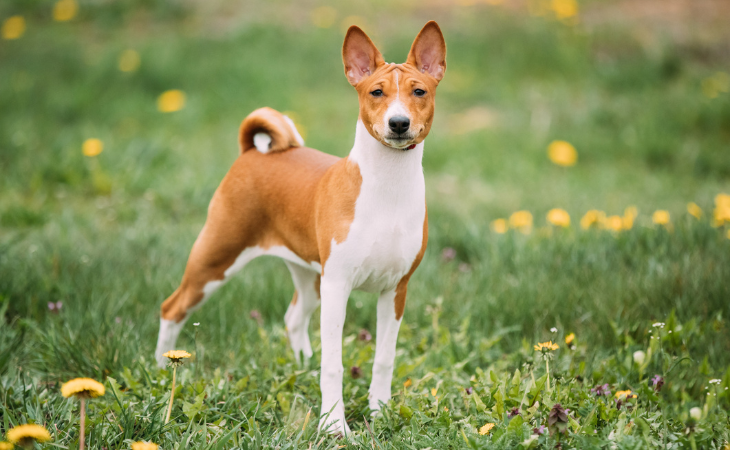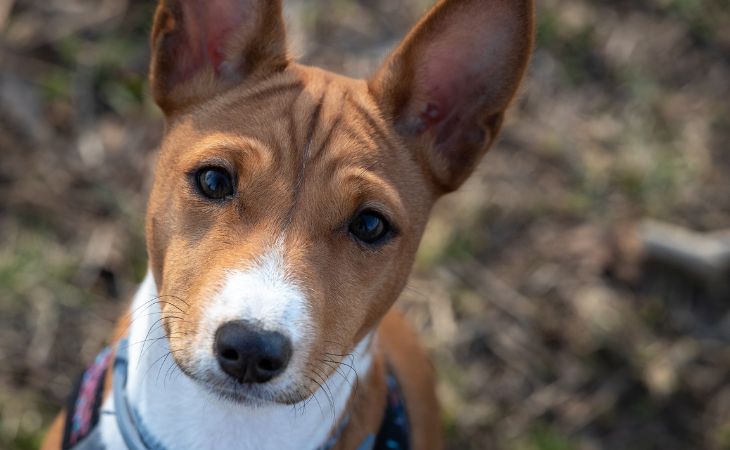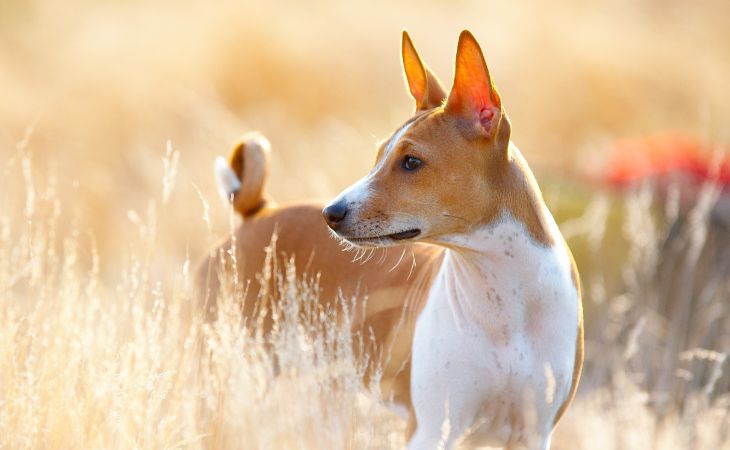Breed standard: FCI I Size: Medium I Average lifespan: 15+ years I Temperament: Alert, curious, and lively I Coat: Short I Origin: Democratic Republic of the Congo.
Are you familiar with the Basenji? These dogs, who are native to Africa, can make anyone fall under their charm! They are elegant, gentle, and curious. A surprising fact about this breed is that they are known for not barking. Instead, the sound that these dogs make resembles yodeling. Similar to cats, they enjoy grooming themselves. Read on to learn more about this unique dog breed!
Basenji: their origins trace back to Ancient Egypt
The Basenji’s origins are very interesting because it allows us to better understand the breed. To begin with, the Basenji is a primitive breed. It is one of the oldest dog breeds that have been recorded to date. This breed’s origins trace back more than 5,000 years. Basenjis were found adorning the tombs of the pharaohs of ancient Egypt.
The breed originated in Central Africa, most likely in Congo because the breed is also called the “chien du Congo” (or “dog from Congo” in French). In the past, this dog was originally a hunting dog breed. It wasn’t until the end of the 19th century, when the breed arrived in the United Kingdom, brought over by explorers, that this dog became a house pet.
Basenji: a breed with lots of character
If you like unique dogs, you will surely fall under this pooch’s charm.
A yodeling dog
The Basenji doesn’t bark. Instead, this breed produces a sound that sounds more like a yodel.
It would actually be more accurate to say that this dog breed grunts and howls. To say that the noises that they make resemble a song or yodels is a bit of a stretch.
The reason behind this unique characteristic is still unclear. It’s possible that they do not bark because of their origins. However, nothing is proven. The sound that these dogs make is adorable.
An elegant dog with an aristocratic appearance
This medium-sized dog has a slim and slender build. The Basenji has an athletic allure and some would even say that this dog has an aristocratic quality. The frame of this dog breed is light. Their long ears point upwards on their head, giving these dogs an elegant look. When they are sitting with their their white flank stretched out, these dogs are stunning.
Their coat is dense, short, thin, and shiny. You will often see this dog bicolor, with a brown and white coat. However, it’s possible to find black dogs with a white chest. This dog is perfect for people who are sensitive or allergic to dogs because they do not lose a lot of hair.
Let’s finish describing the Basenji on a funny note! Did you know that the Basenji’s tail forms a tight curl and unrolls itself on the lower side of the back. The tail of these dogs can sometimes curl more than once and fall up to their thighs.
A hunting dog
This dog originated in Africa and is still used to hunt small animals there. While they became house pets in Europe, it does not mean that they have lost their hunting instincts. The Basenji needs to exercise: they need to run, use up their energy, and play. They should be taken out to walk outside around two to three times a day if they do not have a backyard or garden to play in.

The flexible character of the Basenji
These dogs share many similarities with cats. They are independent, but also like hugs and cuddles when they are in the mood for them. They are affectionate with their owners and the people that are close to them, but are wary around strangers. They are alert, curious, and lively.
Just like cats, Basenjis like to be clean. It’s normal for Basenjis to groom themselves.
But their similarities with cats ends there. These dogs are very loyal to their owners.
Are you still wondering if the Basenji is right for you?
While the Basenji is an affectionate dog with the people they know, they are lively and do not like surprises. If you have young children who cannot resist bothering them, it is probably best to wait until they grow older. These dogs can overreact in stressful situations.
Keep in mind that the Basenji can enjoy living in an apartment. The important thing is that you take this dog out regularly because this energetic dog needs to get out and wander around. If they do not get enough exercise, they can start to develop behavioral problems. For example, they might chew on the feet of your furniture or scratch at the door.
Lastly, if you already have a dog, it shouldn’t be a problem! The Basenji is very friendly.
This dog is a great student!
The Basenji is an intelligent dog. Despite that, these dogs are not known for being easy to train. However, with firm and repetitive training, they will be able to do what you ask of them. It should take around 30 to 40 repetitions for them to understand the orders. Prioritize 15 minute sessions in order to not give your dog anxiety. It’s better to do shorter but more frequent sessions. If the sessions are too long, the Basenji can get stressed and this will work against you.
How do you take care of this dog breed?
These dogs are clean and find pleasure in grooming themselves. They do not need to be shaved or groomed. It’s just important to brush this dog from time to time. Vets recommend brushing this dog once a week to avoid diseases and infections.
Their diet is classic for dogs. Good quality kibble allows them to have well-balanced meals. However, you should avoid treats that can make these dogs gain weight. With their small size, they can easily become overweight.
The Basenji is prone to a few health issues. To begin with, Fanconi syndrome, which is a genetic kidney disease. This syndrome is deadly. To avoid any problems, ask your breeder to test your dog to check their health. This dog can also be prone to inguinal hernias, which are common in dogs of this size, or to hip dysplasia, an abnormality of the hips.
If you have fallen under the charm of this unique dog breed, you can adopt these dogs for around 500 to 1000€ for males and for females, a maximum of 900€.

Did you know?
Female Basenjis go into heat once per year instead of twice. This dog does not reproduce easily, but females can give birth to up to 6 puppies in their litter. This breed does not bark, but they yodel.
Lastly, and it’s not common, they like lounging around like cats.
The Basenji at a glance
Size: Male Basenjis measure around 43 cm (≈ 16.9 in) at the withers. Female Basenjis measure around 40 cm (≈ 15.7 in) at the withers.
Weight: Between 9 and 11 kg (≈ 19.8 and 24.3 lb).
Health: These dogs can easily become overweight. For this reason, it’s important to be careful when it comes to treats. The Basenji is also prone to inguinal hernias, hip dysplasia, and Fanconi syndrome (genetic kidney disease).
Average lifespan: They live around 15 years.
Are Basenjis good with children? Basenjis are not aggressive, but they are prone to stress and do not like surprises. It’s best to avoid letting young children get too close to this dog.
Is the Basenji easy to train? While this dog is intelligent, their training needs to be firm and repetitive.

